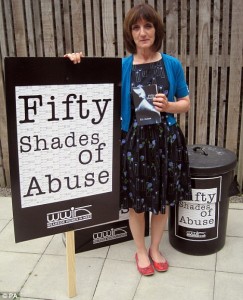Hi everyone! My name is Christina. My twitter username is @C_Kay_P. In my free time I like to practice Tae Kwon Do and play the flute. Currently I am trying to get into the business school and pursue a degree in international business with a minor in German.
Currently, there has been a lot of hype surrounding the 50 Shades of Grey novels because the movie comes out this week. The movie/novel is very controversial because some people argue that it glamorizes violence towards women. They even started a hashtag (#50ShadesIsAbuse) because they think this movie should be boycotted. Others say that 50 Shades encourages women to explore their sexuality in a healthy way. Domestic violence, against women or men, is a serious issue, which is why some people argue that this movie will go too far. Personally, I enjoyed the novels and never viewed them as seriously as some people have. I do think that it has awakened a very touchy subject.
I am most looking forward to learning about how the internet has changed the way that people view issues regarding race and gender. I think it’s a really interesting topic and I’m ready to learn more about it.
